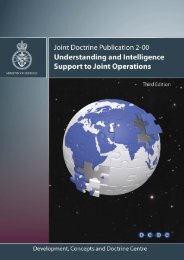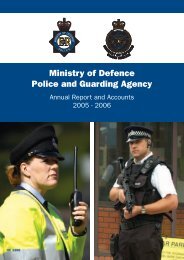Andrew Robathan MP - Ministry of Defence
Andrew Robathan MP - Ministry of Defence
Andrew Robathan MP - Ministry of Defence
You also want an ePaper? Increase the reach of your titles
YUMPU automatically turns print PDFs into web optimized ePapers that Google loves.
the relevant tribunals, before which appeals<br />
against AFCS award decisions are heard,<br />
apply the principles in the judgment.<br />
The principles set out in the judgment<br />
in relation to medical evidence raised<br />
particular issues. At the hearing, Counsel<br />
for the MOD submitted that the decision<br />
maker must take account <strong>of</strong> all available<br />
evidence when determining the nature<br />
and gravity <strong>of</strong> the injury. That principle<br />
was endorsed by the Court (paragraph 47<br />
<strong>of</strong> its judgment), but difficult issues arise<br />
about new medical evidence presented<br />
by the claimant on appeal. Frequently,<br />
this first appears at a tribunal hearing and<br />
comprises <strong>of</strong> self-reported symptoms,<br />
particularly pain and discomfort.<br />
The Review acknowledged that obtaining<br />
objective evidence to test consistency<br />
at that stage can be difficult and could<br />
be at variance with documented earlier<br />
evidence on the person’s function, such<br />
as medical employability grading or<br />
the fact that he/she has deployed.<br />
The Review therefore made two<br />
key recommendations:<br />
z To continue to provide even greater<br />
clarity <strong>of</strong> the AFCS tariff and ensure<br />
clear, simple explanations and<br />
consistency <strong>of</strong> language; and<br />
z To implement improved procedures<br />
to ensure SPVA medical advisors have<br />
an opportunity to comment on the<br />
evidence that is before a tribunal. This<br />
would assist in the evaluation <strong>of</strong> that<br />
evidence by the tribunal.<br />
Implementation <strong>of</strong> Recommendations<br />
Improving clarity and understanding<br />
The revised legislation includes definitions<br />
<strong>of</strong> frequently used terms, for example,<br />
‘functional limitation or restriction’ is now<br />
defined as “difficulty in executing an activity<br />
or a requirement to avoid an activity”. In<br />
14 The Review <strong>of</strong> the Armed Forces Compensation Scheme - One Year On<br />
addition, the tariff has been adjusted to<br />
ensure consistency <strong>of</strong> terminology.<br />
The legislation now makes clear that this<br />
will be assessed by making a comparison<br />
between the injured person and a healthy<br />
person <strong>of</strong> the same age and sex who does not<br />
have an injury or health condition. It is hoped<br />
that this greater clarification and definition<br />
will be helpful to all who use the Scheme.<br />
Until now, the Scheme excluded the payment<br />
<strong>of</strong> benefit for the effects <strong>of</strong> medical treatment<br />
<strong>of</strong> an injury, unless the treatment occurred<br />
overseas where medical facilities are limited.<br />
This exclusion has been removed and Article<br />
5 <strong>of</strong> the new Statutory Instrument provides<br />
that a descriptor encompasses the expected<br />
effects <strong>of</strong> the primary injury and its appropriate<br />
clinical management, including: the effects<br />
<strong>of</strong> operative intervention, therapeutic drug<br />
treatment and the use <strong>of</strong> appropriate aids<br />
and appliances. If a consequential condition<br />
develops, as a result <strong>of</strong> injury or treatment<br />
which in itself appears on the AFCS tariff, a<br />
separate award may therefore be payable.<br />
Improving SPVA procedures –<br />
obtaining medical advice<br />
Procedures at the SPVA, which administers<br />
all AFCS claims, have been strengthened<br />
to ensure that, where appropriate,<br />
medical advice is obtained on cases<br />
prior to being submitted to appeal.<br />
Issue 6 - The circumstances<br />
<strong>of</strong> injury, illness or death<br />
Background and Review Recommendations<br />
The Review recommended that the Scheme<br />
should continue to treat injuries, illness<br />
or death due to service in the same way,<br />
irrespective <strong>of</strong> the precise circumstances in<br />
which that injury, illness or death occurred<br />
because it is the act <strong>of</strong> joining up and<br />
signalling willingness to make a sacrifice for<br />
the Nation that distinguishes those who<br />
serve. For example, the Scheme rightly



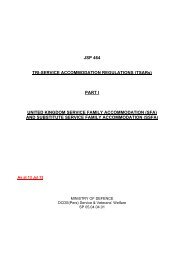
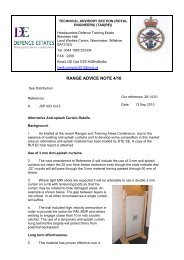

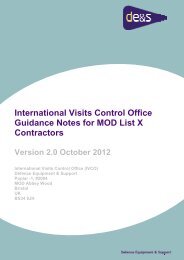
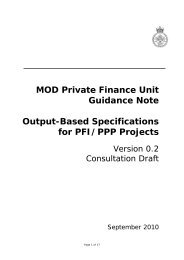
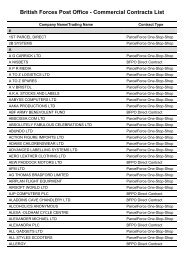
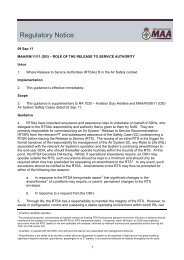
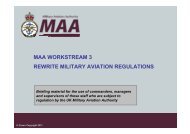
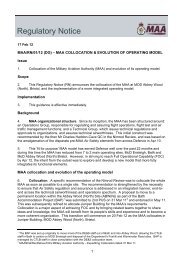
![MAA Regulatory Publications - FAQs PDF [37.3 KB]](https://img.yumpu.com/5906104/1/184x260/maa-regulatory-publications-faqs-pdf-373-kb.jpg?quality=85)
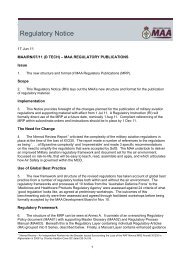
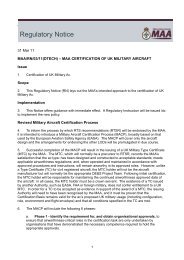
![3750 edition 6 PDF [263.5 KB] - Ministry of Defence](https://img.yumpu.com/5901071/1/184x260/3750-edition-6-pdf-2635-kb-ministry-of-defence.jpg?quality=85)
